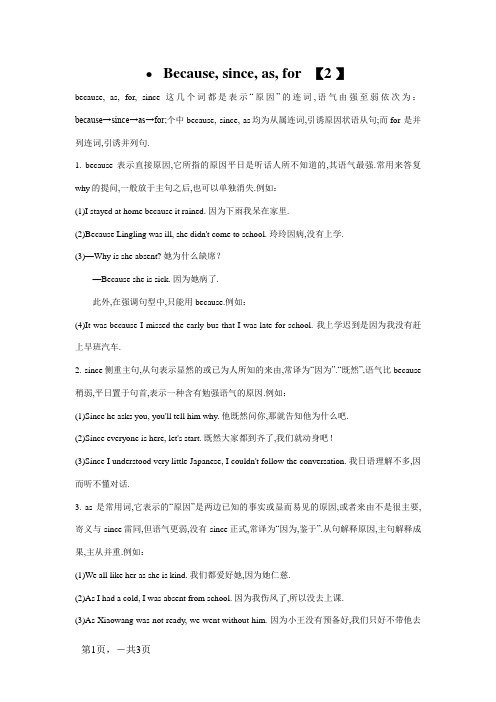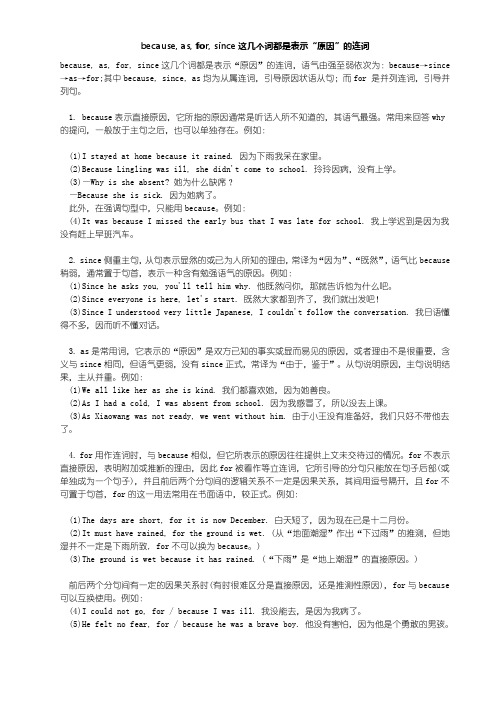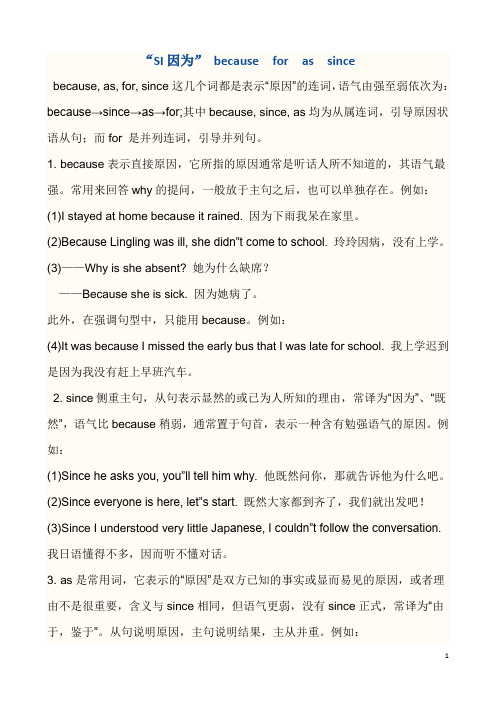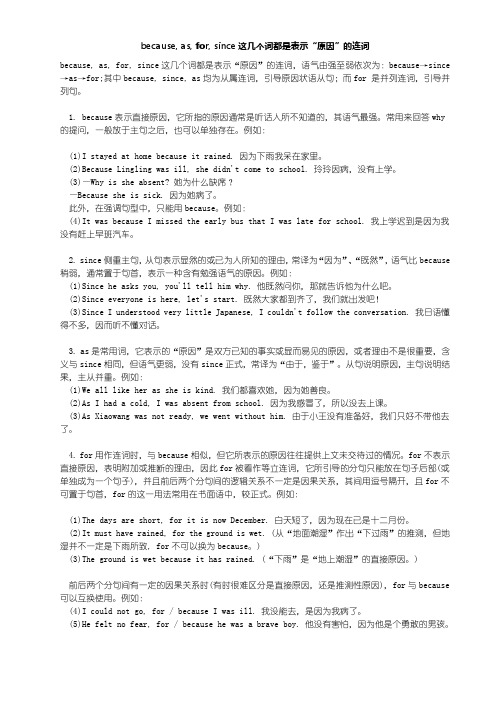as because for since用法区别
as, because, for, since的区别

1.引导原因状语从句的连词有because, since, as , now that2. because, since, as, for 用法比较:because: 语气最强,回答why时用because,所表示的是直接理由,因果关系不能同so连用。
Why are you late? Because there is a traffic jam.since: “既然…..” 表对方已知的事实或理由,常放在句首。
Since you have got enough money with you now, you can come and buy it next time.as: “由于….” 语气较弱,较口语化,表明显的原因或已知的事实,常放在句首。
As he had been ready for the worst, he was not disappointed at the result.for是一个等立连词,连接的是两个并列的分句,其他三个引导的是状语从句;for不能放在句首。
It must have rained last night, for the ground is wet.as/ because/ for/ sinceⅠ. 这三个词都可以用作连词,表“原因、理由”但有区别:Ⅱ. as “因为、既然”表示的原因或理由是明显的。
语意不如because强。
当理由是明显的,或者被认为是已知的时,则以用as 为好。
如:①As he was not well, I decided to go without him. 因为他身体不好,我决定独自去了。
②As it was getting very late, we soon turned back. 因为已很晚了,我们很快就回来了。
③As it is raining, you’d better take a taxi. 既然在下雨,你最好乘出租车。
Because,since,as,for的用法区别

Because, since, as, for 【2 】because, as, for, since这几个词都是表示“原因”的连词,语气由强至弱依次为:because→since→as→for;个中because, since, as均为从属连词,引诱原因状语从句;而for 是并列连词,引诱并列句.1. because表示直接原因,它所指的原因平日是听话人所不知道的,其语气最强.常用来答复why的提问,一般放于主句之后,也可以单独消失.例如:(1)I stayed at home because it rained. 因为下雨我呆在家里.(2)Because Lingling was ill, she didn't come to school. 玲玲因病,没有上学.(3)—Why is she absent? 她为什么缺席?—Because she is sick. 因为她病了.此外,在强调句型中,只能用because.例如:(4)It was because I missed the early bus that I was late for school. 我上学迟到是因为我没有赶上早班汽车.2. since侧重主句,从句表示显然的或已为人所知的来由,常译为“因为”.“既然”,语气比because 稍弱,平日置于句首,表示一种含有勉强语气的原因.例如:(1)Since he asks you, you'll tell him why. 他既然问你,那就告知他为什么吧.(2)Since everyone is here, let's start. 既然大家都到齐了,我们就动身吧!(3)Since I understood very little Japanese, I couldn't follow the conversation. 我日语理解不多,因而听不懂对话.3. as是常用词,它表示的“原因”是两边已知的事实或显而易见的原因,或者来由不是很主要,寄义与since雷同,但语气更弱,没有since正式,常译为“因为,鉴于”.从句解释原因,主句解释成果,主从并重.例如:(1)We all like her as she is kind. 我们都爱好她,因为她仁慈.(2)As I had a cold, I was absent from school. 因为我伤风了,所以没去上课.(3)As Xiaowang was not ready, we went without him. 因为小王没有预备好,我们只好不带他去了.4. for用作连词时,与because类似,但它所表示的原因往往供给上文未交待过的情形.for不表示直接原因,表明附加或揣摸的来由,是以for被看作等立连词,它所引诱的分句只能放在句子后部(或单独成为一个句子),并且前后两个分句间的逻辑关系不必定是因果关系,其间用逗号离隔,且for不可置于句首,for的这一用法常用在书面语中,较正式.例如:(1)The days are short, for it is now December. 白天短了,因为如今已是十二月份.(2)It must have rained, for the ground is wet. (从“地面干燥”作出“下过雨”的推想,但地湿并不必定是下雨所致, for不可以换为because.)(3)The ground is wet because it has rained. (“下雨”是“地上干燥”的直接原因.)前后两个分句间有必定的因果关系时(有时很难区分是直接原因,照样推想性原因),for与because可以交换应用.例如:(4)I could not go, for / because I was ill. 我没能去,是因为我病了.(5)He felt no fear, for / because he was a brave boy. 他没有畏惧,因为他是个大胆的男孩.●Because/asbecause 引诱的是必然原因,as引诱一般原因.必然原因是指某事产生必会导致另一件事实.一般原因语气还有其因果关系不是很显著.以下两个句子请领会The floor is wet,because it rained this morning.As the floor is wet, it might rain this morning.(地板湿也可能是其他原因,以此看,as引诱原因从句还有猜测的意味.)●Because/for这两个词的意思很邻近,平日是可以交换应用的.为了安全起见,最好用because引诱从句,因为同because引诱的从句比拟,for引诱的从句(英文中称为for-clause)的用法要受到某些限制:1 for引诱的从句不能位于它所解释的动词之前:Because it was wet he took a taxi.因为下雨,他叫了一辆出租车.(这里不能用 for.)2 for引诱的从句不能位于not,but或任何连词之后:He stole,not because he wanted the money but because he liked stealing.他偷器械,并不是因为他想要钱,而是他有这种缺点.(这里不能用for.)3 for引诱的从句不能用于答复问题:—Why did you do it?—I did it because I was angry.—你为什么这么做?—因为我朝气才这么做的.(这里不能用for.)4 for引诱的从句不能单单用来复述已讲过的话,而必须包括新的内容:He spoke in French.She was angry because he had spoken in French.他讲法语.因为他讲法语,她朝气了.(这里不能用for.)但是可以说:She was angry,for she didn’t know French.她朝气了,因为她不懂法语.(这里用for是准确的,也可用because.)之所以有这些用法上的限制,其来由是for引诱的从句不能直接解释某一特定动作产生的原因,而只能供给一些起关心解释感化的附加解释.例句如:The days were short,for it was now December.天短了,如今已是12月了.He took the food eagerly,for he has eaten nothing since dawn.他风卷残云地吃了起来,因为他从天亮就没吃过器械.。
because,_since,_as,_for作为原因的区别

because, as, for, since这几个词都是表示“原因”的连词because, as, for, since这几个词都是表示“原因”的连词,语气由强至弱依次为:because→since →as→for;其中because, since, as均为从属连词,引导原因状语从句;而for 是并列连词,引导并列句。
1. because表示直接原因,它所指的原因通常是听话人所不知道的,其语气最强。
常用来回答why 的提问,一般放于主句之后,也可以单独存在。
例如:(1)I stayed at home because it rained. 因为下雨我呆在家里。
(2)Because Lingling was ill, she didn't come to school. 玲玲因病,没有上学。
(3)—Why is she absent? 她为什么缺席?—Because she is sick. 因为她病了。
此外,在强调句型中,只能用because。
例如:(4)It was because I missed the early bus that I was late for school. 我上学迟到是因为我没有赶上早班汽车。
2. since侧重主句,从句表示显然的或已为人所知的理由,常译为“因为”、“既然”,语气比because 稍弱,通常置于句首,表示一种含有勉强语气的原因。
例如:(1)Since he asks you, you'll tell him why. 他既然问你,那就告诉他为什么吧。
(2)Since everyone is here, let's start. 既然大家都到齐了,我们就出发吧!(3)Since I understood very little Japanese, I couldn't follow the conversation. 我日语懂得不多,因而听不懂对话。
四因为as_because_for_since用法区别

“SI因为”because for as sincebecause, as, for, since这几个词都是表示“原因”的连词,语气由强至弱依次为:because→since→as→for;其中because, since, as均为从属连词,引导原因状语从句;而for 是并列连词,引导并列句。
1. because表示直接原因,它所指的原因通常是听话人所不知道的,其语气最强。
常用来回答why的提问,一般放于主句之后,也可以单独存在。
例如:(1)I stayed at home because it rained. 因为下雨我呆在家里。
(2)Because Lingling was ill, she didn”t come to school. 玲玲因病,没有上学。
(3)——Why is she absent? 她为什么缺席?——Because she is sick. 因为她病了。
此外,在强调句型中,只能用because。
例如:(4)It was because I missed the early bus that I was late for school. 我上学迟到是因为我没有赶上早班汽车。
2. since侧重主句,从句表示显然的或已为人所知的理由,常译为“因为”、“既然”,语气比because稍弱,通常置于句首,表示一种含有勉强语气的原因。
例如:(1)Since he asks you, you”ll tell him why. 他既然问你,那就告诉他为什么吧。
(2)Since everyone is here, let”s start. 既然大家都到齐了,我们就出发吧!(3)Since I understood very little Jap anese, I couldn”t follow the conversation. 我日语懂得不多,因而听不懂对话。
3. as是常用词,它表示的“原因”是双方已知的事实或显而易见的原因,或者理由不是很重要,含义与since相同,但语气更弱,没有since正式,常译为“由于,鉴于”。
because, since, as, for作为原因的区别

because, as, for, since这几个词都是表示“原因”的连词because, as, for, since这几个词都是表示“原因”的连词,语气由强至弱依次为:because→since →as→for;其中because, since, as均为从属连词,引导原因状语从句;而for 是并列连词,引导并列句。
1. because表示直接原因,它所指的原因通常是听话人所不知道的,其语气最强。
常用来回答why 的提问,一般放于主句之后,也可以单独存在。
例如:(1)I stayed at home because it rained. 因为下雨我呆在家里。
(2)Because Lingling was ill, she didn't come to school. 玲玲因病,没有上学。
(3)—Why is she absent? 她为什么缺席?—Because she is sick. 因为她病了。
此外,在强调句型中,只能用because。
例如:(4)It was because I missed the early bus that I was late for school. 我上学迟到是因为我没有赶上早班汽车。
2. since侧重主句,从句表示显然的或已为人所知的理由,常译为“因为”、“既然”,语气比because 稍弱,通常置于句首,表示一种含有勉强语气的原因。
例如:(1)Since he asks you, you'll tell him why. 他既然问你,那就告诉他为什么吧。
(2)Since everyone is here, let's start. 既然大家都到齐了,我们就出发吧!(3)Since I understood very little Japanese, I couldn't follow the conversation. 我日语懂得不多,因而听不懂对话。
for,as,because,since区别

前后两个分句间有一定的因果关系时(有时 很难区分是直接原因,还是推测性原因), for与because可以互换使用. (4)I could not go, for / because I was ill. 我没能去,是因为我病了。 (5)He felt no fear, for / because he was a brave boy. 他没有害怕,因为他是个勇敢的 男孩
1. because表示直接原因,它所指的原因通常是听话 人所不知道的,其语气最强。常用来回答why的提 问,一般放于主句之后,也可以单独存在。 (1)I stayed at home because it rained. 因为下雨 我呆在家里。 (2)Because Lingling was ill, she didn”t come to school. 玲玲因病,没有上学。 (3)Why is she absent? 她为什么缺席? Because she is sick. 因为她病了。 此外,在强调句型中,只能用because。例如: (4)It was because I missed the early bus that I was late for school. 我上学迟到是因为我没有赶上早 班汽车。
since侧重主句,从句表示显然的或已为人所知的 理由,常译为“因为”、“既然”,语气比 because稍弱,通常置于句首,表示一种含有勉强 语气的原因。例如: (1)Since he asks you, you”ll tell him why. 他 既然问你,那就告诉他为什么吧。 (2)Since everyone is here, let”s start. 既然大 家都到齐了,我们就出发吧! (3)Since I understood very little Japanese, I couldn”t follow the conversation. 我日语懂得不多, 因而听不懂对话。
小学英语易错点:because, since, as,for的用法区别

1. because的用法because语气最强,表示直接原因,可用于回答why 提出的问题、引导表语从句、用于强调句等,而其余三者均不行。
如:A:Why didn't she come?她为什么没来?B:Because she was very busy.因为她很忙。
It is because he is clever that I like him.是因为他聪明我才喜欢他。
2. since与as两者所表示的原因都是人们已知的,即对已知事实提供理由,而不是表示直接原因。
since 比as 语气稍强,且比as 略为正式,它们引导的从句通常放在主句之前,有时也放在主句之后。
如:As you weren't there, I left a message.由于你不在那儿,我留了个口信。
Since you've been here awhile, you might as well stay.既然你已经来了一段时间,就不妨继续待下去。
另外,since 可用于省略句,而其他三者不行。
如:Since so, I have nothing to say.既然如此,我无话可说。
3. for的用法for是并列连词,而其余三者为从属连词。
for有时可表示因果关系(通常要放在主句之后,且可与because 换用);有时不表示因果关系,而是对前面分句内容的解释或推断(也要放在主句之后,但不能与because 换用)。
比较:The ground is wet,for (=because) it rained last night.地面是湿的,因为昨晚下过雨。
It must have rained last night,for the ground is wet this morning. 昨晚一定下过雨,你看今天早上地面是湿的。
(此句不能用because 代for)。
Because,since,as,for的用法区别[3]
![Because,since,as,for的用法区别[3]](https://img.taocdn.com/s3/m/30a78728a31614791711cc7931b765ce05087a82.png)
Because,since,as,for的用法区别一、becausebecause是最常用的表示原因或者解释的连词,它可以连接两个句子,也可以连接一个句子和一个短语。
because后面的从句通常是主要的信息,而前面的主句通常是次要的信息。
例如:He was late because his car brokedown.(他迟到了,因为他的车坏了。
)She didn't go to school because of herillness.(她因为生病没有去上学。
)因为because后面的从句往往是重点,所以不建议在句首使用beca use,否则会显得语气弱或者不礼貌。
例如:Because I love you, I will do anything foryou.(因为我爱你,我会为你做任何事。
)(不推荐)I will do anything for you because I loveyou.(我会为你做任何事,因为我爱你。
)(推荐)二、sincesince通常表示已知或者显而易见的原因,而不是新的或者意外的原因。
例如:He must be rich since he drives aFerrari.(他一定很有钱,因为他开着法拉利。
)(已知或者显而易见的原因)He is rich because he won thelottery.(他很有钱,因为他中了彩票。
)(新的或者意外的原因)since可以放在句首或者句中,但是如果放在句首,通常要倒装主句和从句的顺序。
例如:Since he is the boss, he can do whatever hewants.(既然他是老板,他可以做任何他想做的事。
)(正常顺序)He can do whatever he wants since he is theboss.(他可以做任何他想做的事,既然他是老板。
)(倒装顺序)since还有一个意思是“自从”,表示时间上的起点,这时候它不表示原因或者解释,而是表示时间状语。
- 1、下载文档前请自行甄别文档内容的完整性,平台不提供额外的编辑、内容补充、找答案等附加服务。
- 2、"仅部分预览"的文档,不可在线预览部分如存在完整性等问题,可反馈申请退款(可完整预览的文档不适用该条件!)。
- 3、如文档侵犯您的权益,请联系客服反馈,我们会尽快为您处理(人工客服工作时间:9:00-18:30)。
because, as, for, since这几个词都是表示“原因”的连词,语气由强至弱依次为:
because→since→as→for;其中because, since, as均为从属连词,引导原因状语从句;而for 是并列连词,引导并列句。
1. because表示直接原因,它所指的原因通常是听话人所不知道的,其语气最强。
常用来回答why的提问,一般放于主句之后,也可以单独存在。
例如:
(1)I stayed at home because it rained. 因为下雨我呆在家里。
(2)Because Lingling was ill, she didn”t come to school. 玲玲因病,没有上学。
(3)�Why is she absent? 她为什么缺席?
�Because she is sick. 因为她病了。
此外,在强调句型中,只能用because。
例如:
(4)It was because I missed the early bus that I was late for school. 我上学迟到是因为我没有赶上早班汽车。
2. since侧重主句,从句表示显然的或已为人所知的理由,常译为“因为”、“既然”,语气比because稍弱,通常置于句首,表示一种含有勉强语气的原因。
例如:
(1)Since he asks you, you”ll tell him why. 他既然问你,那就告诉他为什么吧。
(2)Since everyone is here, let”s start. 既然大家都到齐了,我们就出发吧!
(3)Since I understood very littl e Japanese, I couldn”t follow the conversation. 我日语懂得不多,因而听不懂对话。
3. as是常用词,它表示的“原因”是双方已知的事实或显而易见的原因,或者理由不是很重要,含义与since相同,但语气更弱,没有since正式,常译为“由于,鉴于”。
从句说明原因,主句说明结果,主从并重。
例如:
(1)We all like her as she is kind. 我们都喜欢她,因为她善良。
(2)As I had a cold, I was absent from school. 因为我感冒了,所以没去上课。
(3)As Xiaowang was not ready, we went without him. 由于小王没有准备好,我们只好不带他去了。
4. for用作连词时,与because相似,但它所表示的原因往往提供上文未交待过的情况。
for 不表示直接原因,表明附加或推断的理由,因此for被看作等立连词,它所引导的分句只能
放在句子后部(或单独成为一个句子),并且前后两个分句间的逻辑关系不一定是因果关系,其间用逗号隔开,且for不可置于句首,for的这一用法常用在书面语中,较正式。
例如:
(1)The days are short, for it is now December. 白天短了,因为现在已是十二月份。
(2)It must have rained, for the ground is wet. (从“地面潮湿”作出“下过雨”的推测,但地湿并不一定是下雨所致, for不可以换为because。
)
(3)The ground is wet because it has rained. (“下雨”是“地上潮湿”的直接原因。
)
前后两个分句间有一定的因果关系时(有时很难区分是直接原因,还是推测性原因),for与because可以互换使用。
例如:
(4)I could not go, for / because I was ill. 我没能去,是因为我病了。
(5)He felt no fear, for / because he was a brave boy. 他没有害怕,因为他是个勇敢的男孩。
